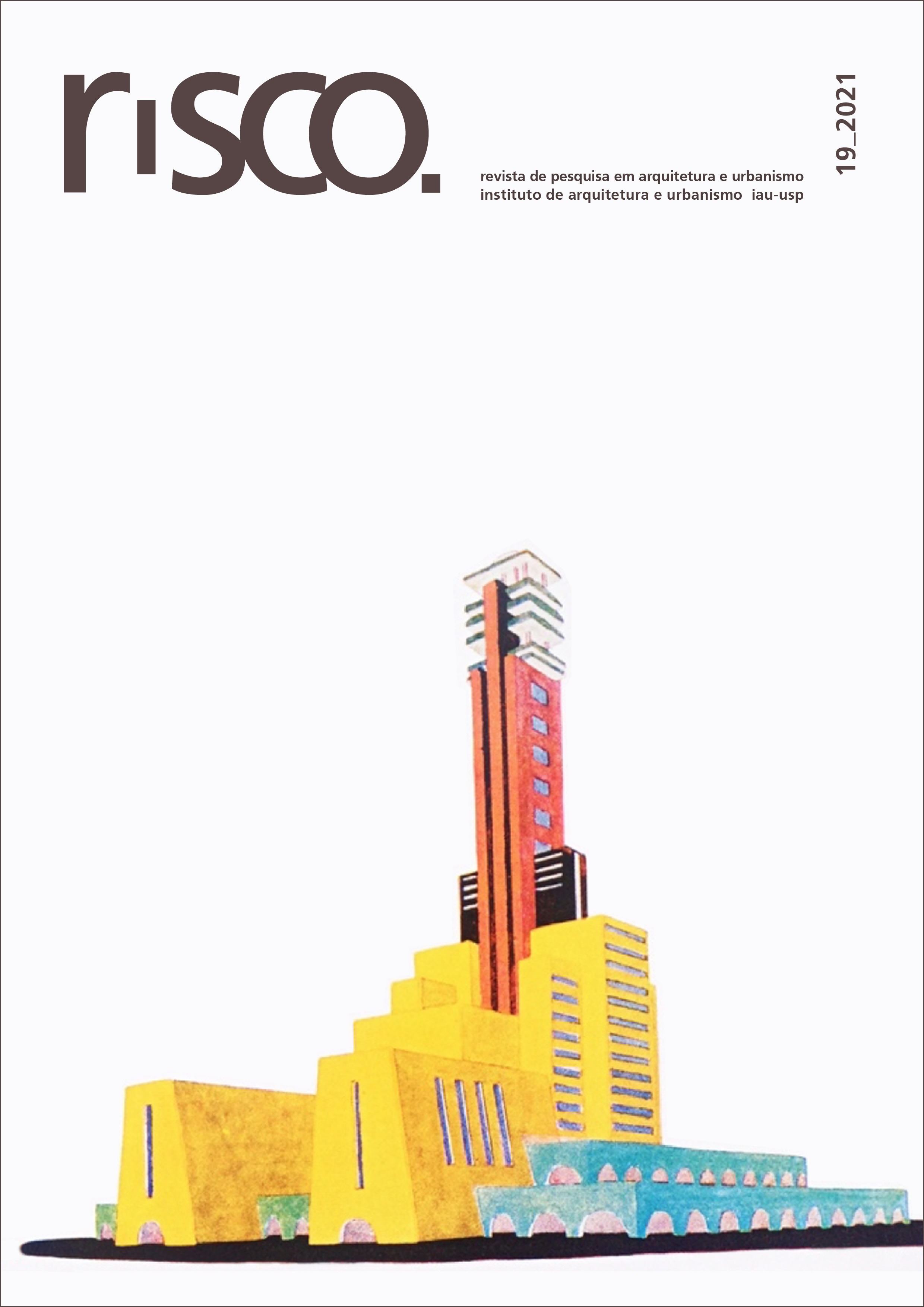Sustainability in Architecture and Urbanism: an ever-present point
DOI:
https://doi.org/10.11606/1984-4506.risco.2021.185689Keywords:
Sociotechnical innovations, political economy, critical accountingAbstract
The publication of the written test of the public competition for associate professor at the Institute of Architecture and Urbanism of the University of São Paulo (IAU-USP), held in November 2020, seeks to contribute to the problematization and updating of the debate on the very polysemic theme of Sustainability in Architecture and Urbanism. Result of a recent bibliographical research, this essay points out an urgency that is, at the same time, its main argument: the socio-technical innovations that have as horizon the sustainability of human life on Earth, developed in the broad field of sciences and technology, need to be embodied with the analyses of value theory, urban governance and critical accounting. Otherwise, they may remain in the exceptionality of the prototype or in the reduced mitigation of environmental damage, or even restricted to certain markets that can pay for such innovations, without touching on the structural issues that guide the processes of accumulation in capitalism.
Downloads
References
ACSELRAD, Henri. Vigiar e unir: a agenda da sustentabilidade urbana. Revista VeraCidade, v. 2, n. 2, p. 1–11, 2007.
ANGELIDOU, Margarita. Smart city policies: A spatial approach. Cities, Current Research on Cities, v. 41, Current Research on Cities, p. S3–S11, 2014. DOI: 10.1016/j.cities.2014.06.007.
BIBRI, Simon Elias; KROGSTIE, John. Smart sustainable cities of the future: An extensive interdisciplinary literature review. Sustainable Cities and Society, v. 31, p. 183–212, 2017. DOI: 10.1016/j.scs.2017.02.016.
CARDOSO, Francisco Ferreira. Estratégias para a formulação de política de ciência, tecnologia e inovação para a indústria da construção civil. São Paulo: Associação Nacional do Ambiente Construído, 2013.
CHRISTOPHERS, Brett. Risking value theory in the political economy of finance and nature. Progress in Human Geography, v. 42, n. 3, p. 330–349, 2018. DOI: 10.1177/0309132516679268.
DING, Grace K. C. Sustainable construction—The role of environmental assessment tools. Journal of Environmental Management, v. 86, n. 3, p. 451–464, 2008. DOI: 10.1016/j.jenvman.2006.12.025.
FRASER, Nancy. Can society be commodities all the way down? Post-Polanyian reflections on capitalist crisis. Economy and Society, v. 43, n. 4, p. 541–558, 2014.
GRAZZIANO, Raphael. Virtualidades e contradições no espaço sob padrões globais: LEED® e arquitetura corporativa em São Paulo. 2019. text - Universidade de São Paulo, 2019. DOI: 10.11606/T.16.2019.tde-11122019-122755. Disponível em: http://www.teses.usp.br/teses/disponiveis/16/16133/tde-11122019-122755/. Acesso em: 26 abr. 2021.
HALL, Stephen; FOXON, Timothy J. Values in the Smart Grid: The co-evolving political economy of smart distribution. Energy Policy, v. 74, p. 600–609, 2014. DOI: 10.1016/j.enpol.2014.08.018.
JABAREEN, Yosef Rafeq. Sustainable Urban Forms: Their Typologies, Models, and Concepts. Journal of Planning Education and Research, v. 26, n. 1, p. 38–52, 2006. DOI: 10.1177/0739456X05285119.
KITCHIN, Rob. The real-time city? Big data and smart urbanism. GeoJournal, v. 79, n. 1, p. 1–14, 2014. DOI: 10.1007/s10708-013-9516-8.
PICON, Antoine. Os limites da inteligência: sobre os desafios enfrentados por Cidades Inteligentes. Revista ECO-Pós, v. 20, n. 3, p. 39–48, 2017. DOI: 10.29146/eco-pos.v20i3.14472.
PURCELL, Thomas F.; LOFTUS, Alex; MARCH, Hug. Value–rent–finance. Progress in Human Geography, v. 44, n. 3, p. 437–456, 2020. DOI: 10.1177/0309132519838064.
RAMBAUD, Alexandre; RICHARD, Jacques. The “Triple Depreciation Line” instead of the “Triple Bottom Line”: Towards a genuine integrated reporting. Critical Perspectives on Accounting, v. 33, p. 92–116, 2015. DOI: 10.1016/j.cpa.2015.01.012.
RICHARD, Jacques. La nature n’a pas de prix... Revue Projet, N° 332, n. 1, p. 81–87, 2013.
SILVA, Vanessa Gomes; SILVA, Maristela Gomes Da. Seleção de materiais e edifícios de alto desempenho ambiental. GONÇALVES, JCS; BODE, K. Edifício Ambiental. São Paulo: Oficina de Textos, p. 129–151, 2015.
YEANG, Ken. Proyectar con la Naturaleza. Barcelona: Editorial Gustavo Gili, 1999.
Downloads
Published
Issue
Section
License
Copyright (c) 2021 Lucia Zanin Shimbo

This work is licensed under a Creative Commons Attribution-NonCommercial-ShareAlike 4.0 International License.
Autores que publicam nesta revista concordam com os seguintes termos:
a. Autores mantém os direitos autorais e concedem à revista o direito de primeira publicação, com o trabalho simultaneamente licenciado sob a Licença Creative Commons Attribution BY-NC-SA que permite o compartilhamento do trabalho com reconhecimento da autoria e publicação inicial nesta revista.
b. Autores têm autorização para assumir contratos adicionais separadamente, para distribuição não-exclusiva da versão do trabalho publicada nesta revista (ex.: publicar em repositório institucional ou como capítulo de livro), com reconhecimento de autoria e publicação inicial nesta revista.
c. Autores têm permissão e são estimulados a publicar e distribuir seu trabalho online (ex.: em repositórios institucionais ou na sua página pessoal) a qualquer ponto antes ou durante o processo editorial, já que isso pode gerar alterações produtivas, bem como aumentar o impacto e a citação do trabalho publicado (Veja O Efeito do Acesso Livre).

















